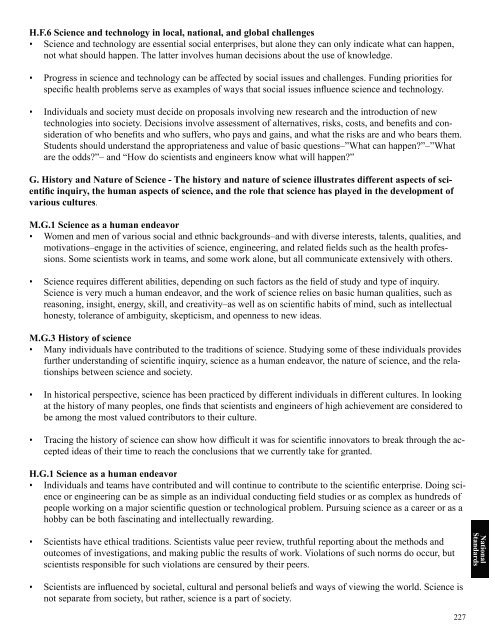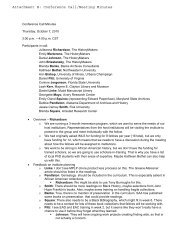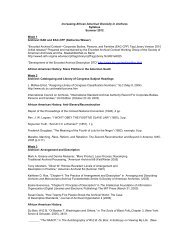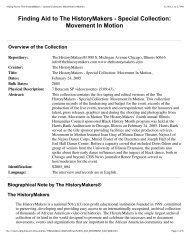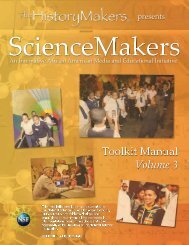ScienceMakers Toolkit Manual - The History Makers
ScienceMakers Toolkit Manual - The History Makers
ScienceMakers Toolkit Manual - The History Makers
You also want an ePaper? Increase the reach of your titles
YUMPU automatically turns print PDFs into web optimized ePapers that Google loves.
H.F.6 Science and technology in local, national, and global challenges<br />
• Science and technology are essential social enterprises, but alone they can only indicate what can happen,<br />
not what should happen. <strong>The</strong> latter involves human decisions about the use of knowledge.<br />
• Progress in science and technology can be affected by social issues and challenges. Funding priorities for<br />
specifi c health problems serve as examples of ways that social issues infl uence science and technology.<br />
• Individuals and society must decide on proposals involving new research and the introduction of new<br />
technologies into society. Decisions involve assessment of alternatives, risks, costs, and benefi ts and consideration<br />
of who benefi ts and who suffers, who pays and gains, and what the risks are and who bears them.<br />
Students should understand the appropriateness and value of basic questions–”What can happen?”–”What<br />
are the odds?”– and “How do scientists and engineers know what will happen?”<br />
G. <strong>History</strong> and Nature of Science - <strong>The</strong> history and nature of science illustrates different aspects of scientifi<br />
c inquiry, the human aspects of science, and the role that science has played in the development of<br />
various cultures.<br />
M.G.1 Science as a human endeavor<br />
• Women and men of various social and ethnic backgrounds–and with diverse interests, talents, qualities, and<br />
motivations–engage in the activities of science, engineering, and related fi elds such as the health professions.<br />
Some scientists work in teams, and some work alone, but all communicate extensively with others.<br />
• Science requires different abilities, depending on such factors as the fi eld of study and type of inquiry.<br />
Science is very much a human endeavor, and the work of science relies on basic human qualities, such as<br />
reasoning, insight, energy, skill, and creativity–as well as on scientifi c habits of mind, such as intellectual<br />
honesty, tolerance of ambiguity, skepticism, and openness to new ideas.<br />
M.G.3 <strong>History</strong> of science<br />
• Many individuals have contributed to the traditions of science. Studying some of these individuals provides<br />
further understanding of scientifi c inquiry, science as a human endeavor, the nature of science, and the relationships<br />
between science and society.<br />
• In historical perspective, science has been practiced by different individuals in different cultures. In looking<br />
at the history of many peoples, one fi nds that scientists and engineers of high achievement are considered to<br />
be among the most valued contributors to their culture.<br />
• Tracing the history of science can show how diffi cult it was for scientifi c innovators to break through the accepted<br />
ideas of their time to reach the conclusions that we currently take for granted.<br />
H.G.1 Science as a human endeavor<br />
• Individuals and teams have contributed and will continue to contribute to the scientifi c enterprise. Doing science<br />
or engineering can be as simple as an individual conducting fi eld studies or as complex as hundreds of<br />
people working on a major scientifi c question or technological problem. Pursuing science as a career or as a<br />
hobby can be both fascinating and intellectually rewarding.<br />
• Scientists have ethical traditions. Scientists value peer review, truthful reporting about the methods and<br />
outcomes of investigations, and making public the results of work. Violations of such norms do occur, but<br />
scientists responsible for such violations are censured by their peers.<br />
• Scientists are infl uenced by societal, cultural and personal beliefs and ways of viewing the world. Science is<br />
not separate from society, but rather, science is a part of society.<br />
227<br />
National<br />
Standards


